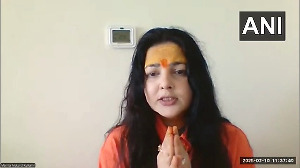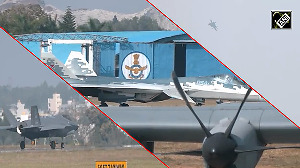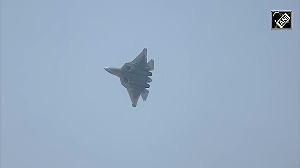Contrary to what it may seem, United States President George W Bush's maiden India visit is not just about the landmark India-United States nuclear deal.
There are other agreements that came about after Prime Minister Dr Manmohan Singh's visit to Washington last July.
The progress of these deals will be discussed and assessed by President Bush and Prime Minister Singh this week.
Experts say the variety of pacts - which have largely been ignored in the media carpet-bombing on the nuclear deal -- have the potential to make India a knowledge hub.
A quick guide to what these agreements are and where they stand.
The CEOs ForumSet up to share ideas between the captains of industry, boost the bilateral economic relationship and to learn from each other's business practices, the 20-member Chief Executive Officers Forum comprises corporate honchos from both countries.
The Indian group includes Tata Group Chairman Ratan Tata, Reliance Industries Chairman Mukesh Ambani, Infosys Technologies CEO and Managing Director Nandan Nilekani and Housing Development Finance Corporation Chairman Deepak Parekh.
The US group includes Citigroup CEO Charles Prince and JP Morgan Chase Chairman William Harrison.
Soon after it was set up, the Forum's members were split into different industry groups covering finance, biotech, information technology and infrastructure.
They will meet with President Bush and Prime Minister Singh and report on their work in progress.
The crux of their discussions so far has related to trade barriers.
India Inc's wish list for the government includes reduction of red tape and tariffs, and opening up the economy to more foreign direct investment.
Both leaders established intellectual property right protocols and other provisions necessary for active collaborative research and for accelerating cooperation between Indian and US scientists in government agencies, private sector and academia in areas like basic science, space, energy, nanotechnology, health, and IT.
A number of official-level meetings have been held in the last few months to optimise the benefits of these agreements.
Since these require a huge action plan, different ministries are still trying to coordinate things.
An Energy DialogueThis agreement envisaged the constitution of five Working Groups on Oil and Gas, Coal, Power and Energy Efficiency, New Technologies and Renewable Energy, and Civil Nuclear Energy.
The Oil and Gas Working Group has met once in the last six months. It broadly discussed the means to changing the approach of public sector oil companies -- both on exploration rights and adoption of newer technologies -- and creating a credible regulatory framework to entice private investment.
The Working Group on Coal is discussing means for improving productivity and clean fuel production. It needs long-awaited reforms in the coal sector.
The Power and Efficiency Working Group is working on enhancing end-use efficiency with emphasis on 'last-mile' distribution (reading meters, collecting payments, etc in rural areas).
The Civil Nuclear Working Group has met several times in the past eight months, and is the most discussed issue on the eve of Bush's visit.
The goal of the Initiative is to re-energise the agricultural relationship between the two nations through collaborative efforts in agricultural research, education and commercial linkages.
A board of eight members -- from academia, the government and the private sector in both countries -- has been formed to recommend specific projects and funding sources.
American Foreign Agricultural Service Administrator Ellen Terpstra co-chairs the board with Indian Council for Agricultural Research chief Mangala Rai.
Nobel Laureate Norman Borlaug and agriculture scientist M S Swaminathan are honorary advisers to the board.
Areas of collaboration are expected to include research on sustainable agriculture and marketing systems, the use of new information and communication technologies, implementation of international food safety and sanitary requirements, and other priority areas as determined by the board.
As per the Initiative, both the US and India -- leaders in different fields of science and technology -- will complement each other's capabilities through strategic alliance in key areas, which are currently being finalised.
It was launched to develop and support the democratic process, institutions and resources that strengthen the foundations that make democracies credible and effective -- in countries that seek such assistance.
India and the US have been working together to strengthen democratic practices and capacities and contribute to the new United Nations Democracy Fund.
The fight against AIDSThe partnership is committed to strengthen cooperation and to combat HIV/AIDs on a global level through an initiative that mobilises the private sector and government resources, knowledge, and expertise.
The agreement enables Indian pharmaceutical companies to make an important contribution in making anti-retroviral drugs available at affordable costs to India and other countries.
Hopefully, the new incentives for research and development in this area will be fully grasped.
It was formed to build on the experience of the Tsunami Core Group, and to strengthen cooperation to prepare for and conduct disaster relief operations.
India is building a tsunami warning system with the help of US.
Also see:
Date with History: President Bush Visits India
Chat with global experts on the Bush visit
Blog: Bushfire






 © 2025
© 2025